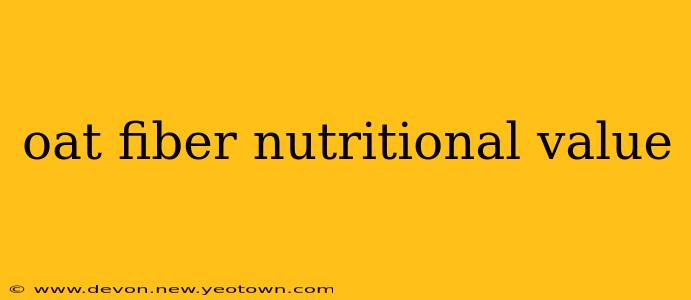Let's be honest, oats have always been a bit of a health food underdog. We know they're good for us, but often they're relegated to a breakfast bowl. What many people miss is the powerhouse nutritional punch packed within oat fiber. This isn't just some boring, indigestible roughage; oat fiber is a complex carbohydrate brimming with benefits for your gut health, weight management, and overall well-being. It's time to give this unsung hero the recognition it deserves.
My journey with oat fiber began a few years ago, when I was researching ways to improve my digestive health and manage my cholesterol. What I discovered was a fascinating world of soluble and insoluble fibers, prebiotics, and their profound impact on the body. This article will explore the nutritional value of oat fiber in detail, answering some common questions you might have.
What is oat fiber, and what are its benefits?
Oat fiber is a type of dietary fiber extracted from oats. Unlike the whole oat groats, oat fiber is concentrated, meaning you get a higher dose of fiber in a smaller amount. This makes it incredibly versatile and easy to incorporate into your diet. Its benefits are numerous:
-
Improved Digestive Health: Oat fiber, particularly the soluble type, acts like a sponge in your gut, absorbing water and forming a gel-like substance. This helps regulate bowel movements, preventing both constipation and diarrhea. It also feeds the beneficial bacteria in your gut, promoting a healthy microbiome.
-
Cholesterol Management: Studies have shown that soluble oat fiber can help lower LDL ("bad") cholesterol levels. This is because it binds to cholesterol in the digestive tract, preventing its absorption into the bloodstream.
-
Blood Sugar Regulation: Oat fiber slows down the digestion and absorption of sugars, preventing blood sugar spikes and crashes. This is especially beneficial for people with type 2 diabetes or those at risk of developing it.
-
Weight Management: The high fiber content of oat fiber promotes satiety, meaning you feel fuller for longer. This can help you eat fewer calories and manage your weight effectively.
What is the difference between soluble and insoluble oat fiber?
This is a crucial distinction. Both types are beneficial, but they work in slightly different ways:
-
Soluble Oat Fiber: This type dissolves in water, forming a viscous gel. It's the primary component responsible for lowering cholesterol and regulating blood sugar.
-
Insoluble Oat Fiber: This type doesn't dissolve in water. Instead, it adds bulk to the stool, promoting regular bowel movements and preventing constipation.
How much oat fiber should I consume daily?
The recommended daily intake of fiber varies depending on age and other factors. However, aiming for at least 25-30 grams of fiber per day is generally recommended. Oat fiber can contribute significantly to reaching this goal. Start by gradually increasing your fiber intake to avoid digestive discomfort.
What are some good sources of oat fiber?
You can find oat fiber in various forms:
- Oat bran: A byproduct of oat processing, it's a good source of both soluble and insoluble fiber.
- Oat fiber supplements: These are concentrated forms of oat fiber, often available in powder or capsule form.
- Whole oats (rolled oats, steel-cut oats): While not as concentrated as oat bran or supplements, whole oats still provide a good amount of fiber.
- Many processed foods: Check food labels, as many manufacturers now add oat fiber to enhance texture and nutritional value.
Is oat fiber safe for everyone?
While generally safe, some individuals might experience digestive side effects such as bloating or gas when they first start consuming more fiber. Gradually increasing your intake can help minimize these effects. If you have any underlying health conditions, it's always best to consult your doctor before making significant changes to your diet.
Can oat fiber help with weight loss?
The high fiber content of oat fiber contributes to feelings of fullness and satiety, which can help with weight management. However, it's crucial to remember that oat fiber is just one piece of the puzzle. A balanced diet, regular exercise, and a healthy lifestyle are essential for effective weight loss.
My personal experience with oat fiber has been overwhelmingly positive. Incorporating it into my daily routine has improved my digestion, helped me manage my cholesterol, and contributed to a healthier overall lifestyle. While it may not be the most glamorous food item, oat fiber is a powerful nutritional force, and it’s time we all gave it the credit it deserves.

